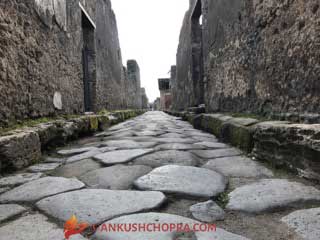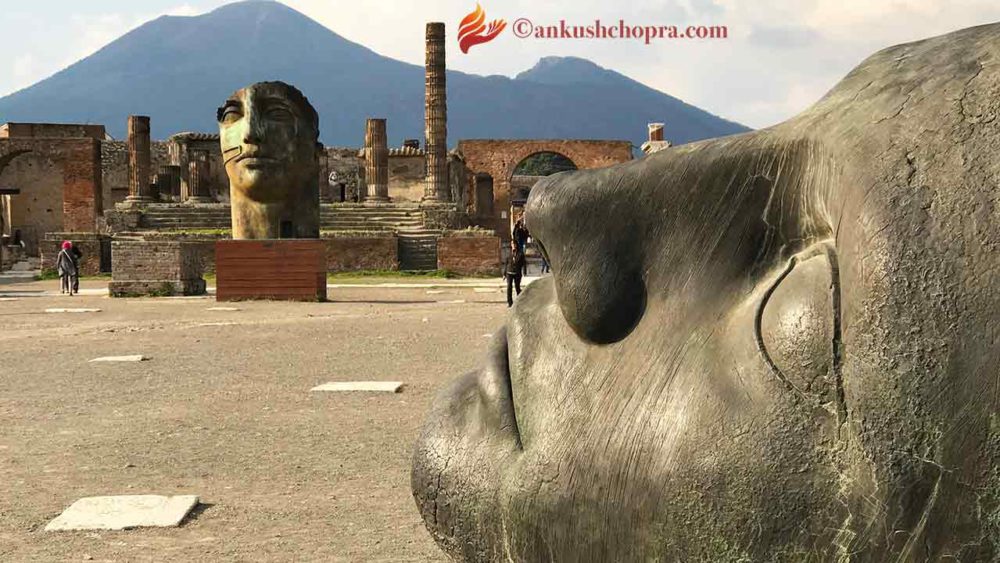Have you ever witnessed something beautiful and frightening at the same time? I had the opportunity to see something like that during my visit to Pompeii in Italy. As I walked through the ruins imagining how beautiful and advanced the community back then was, I could not erase the veneer of truth over those ruins; one of the most advanced cities was erased from the earth by a natural disaster. I couldn’t help but wonder if there are any lessons in survival from the ruins of Pompeii?
 A Walk in Pompeii
A Walk in Pompeii
As you walk through the stone paved paths in Pompeii, it is evident that there was great opulence in the city. The city dwellers took pride in showing off their immense wealth. The prosperity of Pompeii was a key reason for its prominence back in the day. And that prominence and prestige were built on a strong economic foundation. Under that economic foundation was both fertile grounds and an excellent geographical location. The lava terracing around the city gave it a security advantage, and the volcanic soil allowed flourishing agriculture. From any perspective, it was a city of gold on the coveted hill.
A Fateful Event
But in spite of that opulence and prominence, it was not protected from everything. In spite of that coveted position, and great wealth the city was engulfed by a massive volcanic explosion. One fateful morning, in 79 AD, the population of Pompeii met a tragic end in a short period. As lava ashes fell on the city, the population perished. Some were running away from the ashes while others were buried in their own homes. None of the great wealth, opulence, and superior vantage point could prevent the tragedy that stuck Pompeii.
Today, Pompeii is a tragic reminder of the ephemeral nature of life. But the firms are not supposed to be transitory. They are expected to outlast the mortals that build them. Even the great General Electric, an original Dow component is no longer in the index. When Tom Peters wrote In Search Of Excellence, he sang high praises for Atari. Where is it today? Remember MySpace? Even organizations are not immune to the vicissitudes of life that we mortals are. But organizations are not just legal entities; they are a lot more. Business organizations are a source of vitality and energy in the economy. They are a source of meaning to their members. And this is why a critical part of business leaders’ job is to ensure that their firms survive any and all potential threats.
Lessons in Survival from the Ruins of Pompeii
As I walked down the pebbled streets of Pompeii, while my eyes watched the beauty of yesteryears my mind questioned whether those ruins provide any lessons for business and political leaders? Was the outcome in Pompeii ever preventable or should we just accept death as a part of life? On the screen of my mind, two words kept popping up as I stood in the town square looking at the fallen statues: risk management. The only thing the population of Pompeii could have done to prevent a loss of life and community was risk management. A country like Maldives that is sinking in the sea today needs to do the same. But equally important, business leaders need to manage risks too.
The Questions you need to answer
Do you know which disaster is heading towards your business today? Is it new competition or a massive change in regulation? Are you aware of the tectonic plates on which your industry stands today? Are those plates shifting slowly but inexorably? Is your product or technology losing relevance? Is there a potent force heading towards you from an adjacent industry? Most importantly, do you have a way of scanning for these threats?
Avoiding The Fate of Pompeii
If you want to avoid the fate of Pompeii, the key lesson for you is this: make sure you have a systematic process that answers the above questions for your business on a regular basis. If you do not have such a process, you may be making the same mistake that Pompeii made: living on a volcano in blissful ignorance.
I wrote about building a Tsunami alert system for every business in my book The Dark Side of Innovation. There I suggested four critical pieces of such a system. First, it should have the ability to predict and observe changes in the foundations of your industry and business. Second, it should allow you to assess and understand slow changing trends. Third, it should enable you to plan various responses for different eventualities. And finally, it should enable you to manage risk no matter what the outcome in future.
The key lesson in survival from the ruins of Pompeii to me was that every business needs a robust tsunami alert system Do you have one?





Please note: I reserve the right to delete comments that are offensive, or off-topic. If in doubt, read my Comments Policy.